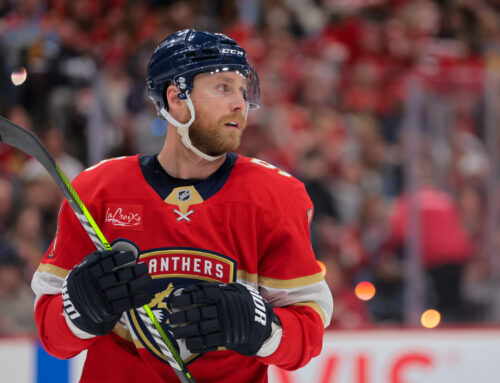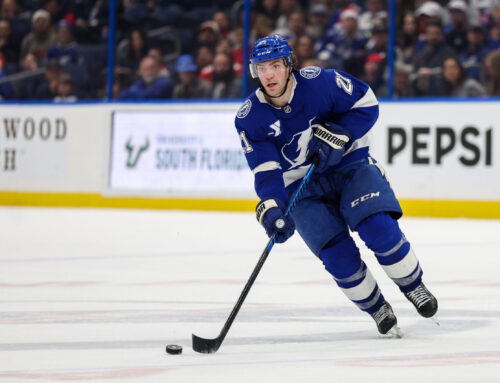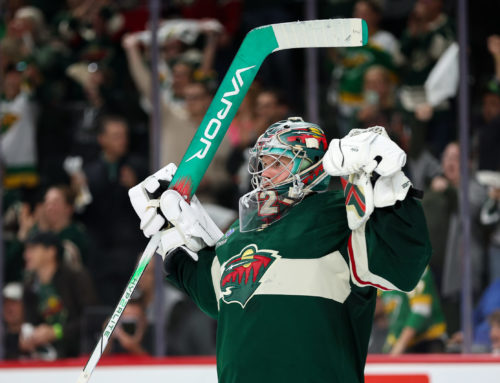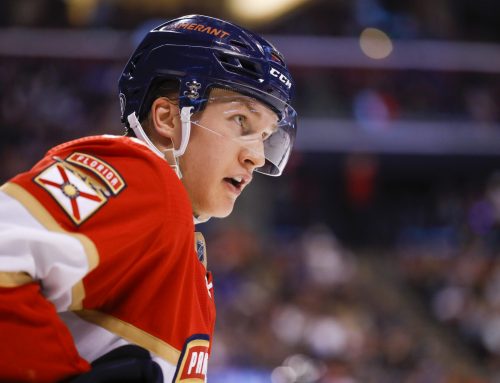
The Final Match – Vote for the better Multi-Cat Fantasy Hockey Player – Backes vs. Byfuglien
Well folks – this is it. Over the past few weeks we’ve gone all the way from 36 noble challengers down to the final two competitors in our quest to crown the NHL’s best multi-cat player (i.e., Hits, Blocked Shots, PIMs, and Shots). I’ll briefly cover the results of the last week’s “final four” matches, and then set up the ultimate battle between the last two players standing – Dustin Byfuglien and David Backes.
Final voting will take place within the Black Aces area of the Forums – click on “VOTE HERE” below to go to the voting area for the final match. This time voting closes at 11:59PM on Monday January 6th.
After the brackets I’ve included one last “real life” Cage Match, where instead of comparing two hockey players I’ll tackle a different side-by-side debate. This week it’s whether you’re better off having bad local “big four” teams to root for or no local “big four” teams at all.
Results, Analysis, and Final Match Voting Link
Dustin Byfuglien (19 Votes) DEFEATED P.K. Subban (9 Votes)
David Backes (17 Votes) DEFEATED Zdeno Chara (6 Votes)
I knew voting totals would be down by a lot this round, what with the Christmas holiday and NHL break. But I’m guessing there would’ve been a similar results ratio had two or even three times as many votes been cast. In other words, this outcome was pretty much guaranteed before polls even opened.
But still – let’s not take anything away from Subban or Chara, who both had outstanding showings in the tournament. The only things I’m left wondering are whether Subban might’ve mounted a bigger challenge had he been paired against Backes, or whether Shea Weber – last week’s toughest luck elimination – also might’ve fared better than Chara against Backes.
But in the end, it’s Backes and Byfuglien who are the last men standing and will now face off for the ultimate Cage Match title! This is the week that you need to vote, since there is no next week! History will be made, and only those who vote will be able to lay claim to having been part of the final decision.
Dustin Byfuglien v. David Backes – VOTE HERE
Links to the rest of the Cage Match Tournament:
| Tournament – Best Multi-Category Player Round 4 | |||
| Tournament – Best Multi-Category Player Round 3 | |||
| Tournament – Best Multi-Category Player Round 2 | |||
| Tournament – Best Multi-Category Player Round 1 |
Bonus Real Life Cage Match
If you’ve read my bio on DobberHockey you know I’m from Massachusetts, and as a 43 year old I’ve seen both highs and lows from each of the “big four” (defined as hockey, baseball, basketball, and football) Massachusetts-based sports teams. And despite at least one championship from each team in the past ten years, what I remember most is the stretch from 1972 until 2001, when three of the “big four” failed to win a single championship.
During that roughly 30-year dry spell, a common refrain among frustrated Massachusetts sport talk radio fans was that it would almost be better if we didn’t have those teams at all rather than be forced to watch them disappoint us time and time again. Time to settle that debate right here, right now – is it better to have local “big four” teams to root for, even if they might lose year after year, or is it better to have no “big four” team at all instead of having to deal with the sting of losing every season.
One thing is for sure – in this era of digital cable TV, the internet, twitter, and social media, it’s easier than ever to closely follow a team that isn’t in your own backyard. That’s in contrast to just 10 years ago, where newspapers, magazines, and analog cable were still the norm, making it nearly impossible to really feel like an everyday fan for any team but the one(s) covered by your local media and TV outlets.
But can you ever have a truly special attachment to a team if it’s all the way across the country, or even the world? One thing to consider is that if you don’t have one or more “big four” teams near you, you don’t automatically have to root for another team far away. This is because even remote areas tend to have their share of local minor league teams, junior teams, or even college teams (perhaps from one’s alma mater). Take hockey for example – you can feel every bit the fan even if you don’t get the privilege of living near one of the 30 NHL squads, thanks to the likes of the AHL, major junior hockey, NCAA hockey, the KHL or other foreign leagues, not to mention Canadian or USA women’s hockey. In short, you’ll almost always have options for teams to root for near you.
Still, being able to root for one or more local big four teams – even if they lose – means that you’re able to have a personal connection to (and, if desired, witness in person the games of) arguably the best athletes in the world at their respective sports. Plus, if you’re like me and have kids, it’s great fun to share in their excitement in following their favorite players and teams, not to mention the excitement of seeing folks wear jerseys near opening day, when even perennial losing teams can be contenders. But try having a nine year old root for a team 1500 miles away – it usually doesn’t go over too well.
What’s more, it’s not the end of the world if your local big four team or teams aren’t successful. In fact, it can make it easier to get less expensive tickets to games and it still provides you the opportunity to see other great teams when they’re in town.
In the end, there really is no winner or loser in this debate – that is, both situations are neither optimal nor terrible. What’s key is technology has allowed people to pick virtually any team anywhere in the world and arguably be as passionate a fan for that team as if they lived in that team’s neck of the woods, since before that was possible it indeed would’ve been better to have a team – even one that never wins – in your own backyard.





 EDM
EDM TOR
TOR PIT
PIT VAN
VAN FLA
FLA MIN
MIN DET
DET COL
COL ARI
ARI
